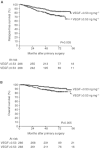The prognostic value of vascular endothelial growth factor in 574 node-negative breast cancer patients who did not receive adjuvant systemic therapy
- PMID: 12232762
- PMCID: PMC2364266
- DOI: 10.1038/sj.bjc.6600555
The prognostic value of vascular endothelial growth factor in 574 node-negative breast cancer patients who did not receive adjuvant systemic therapy
Abstract
The growth and metastasising capacity of solid tumours are dependent on angiogenesis. Vascular endothelial growth factor is a mediator of angiogenesis. In this study we investigated whether vascular endothelial growth factor is associated with the natural course of the disease in primary invasive breast cancer. In 574 tumours of patients with node-negative invasive breast cancer the cytosolic levels of vascular endothelial growth factor were measured using a quantitative enzyme-linked immunosorbent assay. These patients did not receive adjuvant systemic therapy and were followed for a median follow-up time of 61 months (range 2-155 months) after the primary diagnosis. Correlations with well-known prognostic factors, and univariate and multivariate survival analyses were performed. Vascular endothelial growth factor level was positively associated with age and tumour size (P=0.042 and P=0.029, respectively). In addition, vascular endothelial growth factor level was inversely, but weakly correlated with progesterone receptor levels (PgR) (r(s)=-0.090, P=0.035). A high vascular endothelial growth factor level (equal or above the median level of 0.53 ng mg(-1) protein) predicted a reduced relapse-free survival and overall survival in the univariate survival rate analysis (for both P=0.005). In the multivariate analysis as well, vascular endothelial growth factor showed to be an independent predictor of poor relapse-free survival and overall survival (P=0.045 and P=0.029, respectively), in addition to age, tumour size and PgR. The results show that cytosolic levels of vascular endothelial growth factor in tumour tissue samples are independently indicative of prognosis for patients with node-negative breast cancer who were not treated with adjuvant systemic therapy. This implies that vascular endothelial growth factor is related with the natural course of breast cancer progression.
Figures

References
-
- AbulafiaOTriestWEShererDM1999Angiogenesis in malignancies of the female genital tract Gynecol Oncol 72220231 - PubMed
-
- AmorosoADel PortoFDi MonacoCManfrediniPAfeltraA1997Vascular endothelial growth factor: A key mediator of neoangiogenesisA reviewEur Rev Med Pharmacol Sci 11725 - PubMed
-
- AnanKMorisakiTKatanoMIkuboAKitsukiHUchiyamaAKurokiSTanakaMTorisuM1996Vascular endothelial growth factor and platelet-derived growth factor are potential angiogenic and metastatic factors in human breast cancer Surgery 119333339 - PubMed
-
- BokRAHalabiSFeiDTRodriquezCRHayesDFVogelzangNJKantoffPShumanMASmallEJ2001Vascular endothelial growth factor and basic fibroblast growth factor urine levels as predictors of outcome in hormone-refractory prostate cancer patients: a cancer and leukemia group B study Cancer Res 6125332536 - PubMed
-
- BossEAMassugerLFAGThomasCMGGeurts-MoespotABoonstraHSweepCGJ2001Vascular endothelial growth factor in ovarian cyst fluid Cancer 91371377 - PubMed
MeSH terms
Substances
LinkOut - more resources
Full Text Sources
Other Literature Sources
Medical
Molecular Biology Databases
Research Materials

